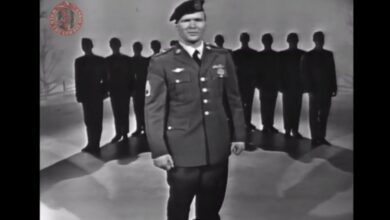This is the best version of this song by an extraordinary country artist.
Ricky Van Shelton’s performance of “Statue of a Fool” stands out as a deeply moving and impactful expression of his profound connection to traditional country music. Hailing from Danville, Virginia, where he was born in 1952, Shelton was surrounded by the sounds of classic country from an early age. This early immersion allowed him to grasp the melodies and storytelling components that are central to the genre. His childhood was enriched with influences from the Grand Ole Opry as well as the traditional church hymns, all of which played a significant role in shaping his musical tastes and his love for country music.
After relocating to Nashville, Shelton signed with Columbia Records and released his debut album, “Wild-Eyed Dream,” in 1986. This album quickly captured attention, yielding hit singles like “Crime of Passion” and “Somebody Lied,” which highlighted his vocal abilities and knack for crafting relatable stories in his songs. These tracks resonated with listeners and propelled Shelton into the spotlight, establishing him as an emerging star in the lively country music scene of the late 1980s.
“Statue of a Fool,” penned by Jan Crutchfield, became a defining part of Shelton’s work when it appeared on his 1990 album, “RVS III.” The song’s heartfelt lyrics explore themes of regret and heartbreak, striking a chord with listeners who have experienced similar feelings. Shelton’s ability to infuse the song with emotional depth and sincerity showcased his interpretative prowess. His strong voice, blending warmth with vulnerability, brought the lyrics to life, inviting the audience to share in the pain and reflection expressed in the song.
As Shelton continued to create music, he honed a distinctive style that heavily drew on traditional country influences. His work was marked by a commitment to genuine storytelling, often reflecting personal experiences and universal emotions that resonate with fans. Each song narrated a story, a vital element of country music that engaged listeners and secured his status as a beloved artist in the genre.
Throughout his career, Shelton remained committed to his traditional country roots, even amid significant changes in the genre. While many artists leaned towards pop-infused sounds, Shelton’s dedication to preserving the timeless essence of classic country music earned him widespread recognition. His contributions were celebrated with numerous accolades, including multiple Country Music Association (CMA) awards, affirming his place in the industry as an artist who honored the genre’s legacy. These honors not only recognized his vocal talent but also highlighted the emotional impact of his storytelling in a rapidly changing musical landscape.
In addition to his musical pursuits, Shelton ventured into writing children’s books, showcasing his diverse creative talents. This expansion illustrated his ability to reach audiences beyond music, with the books often reflecting the storytelling elements that are central to both country music and literature. His aim to inspire younger generations and cultivate a love for stories mirrored the narratives found in his songs, further endearing him to fans who appreciated this multifaceted approach.
Despite enjoying a successful career, Shelton faced personal challenges, particularly with alcohol, which he openly discussed in interviews. He shared how these struggles influenced his life and prompted him to reassess his priorities. His candidness added a layer of authenticity to his music, allowing listeners to feel the genuine sentiment woven into his performances. This openness helped forge a deeper connection with his fans, who could see themselves reflected in his experiences. It is this honesty that elevated his music, creating a space for fans to feel heard and understood.
In the mid-2000s, Shelton made the significant choice to step back from the demanding pace of the music industry, focusing instead on family and personal wellness. He sought refuge in a quieter life, away from the limelight, which provided him the opportunity to reflect on his career and reassess what truly mattered. Although he may not perform regularly anymore, his recordings continue to resonate, and his influence on the country music realm remains strong. Many view this time as one of rejuvenation, allowing him to further develop his artistry free from the pressures of constant public attention.
“Statue of a Fool” endures as a timeless testament to Shelton’s talent and contribution to country music. The way he encapsulated themes of love, loss, and introspection within the song ensures its lasting impact on listeners. His interpretation continues to resonate with fans across generations, showcasing not only his enduring influence but also the universal themes that make country music so relatable. The emotional richness conveyed through his delivery transcends boundaries, enabling listeners to engage with the song on a deeply personal level.
As a trailblazer in preserving the roots of the genre, Shelton’s legacy is firmly established in country music history. His influence played a vital role in shaping the sound of the 1980s and 1990s, paving the way for new artists to explore their creative paths while respecting the traditions that came before them. The heartfelt, authentic storytelling present in his work will continue to be cherished, ensuring that his music resonates long after the final chords have faded. This enduring impact underscores the significance of honoring one’s origins while also allowing personal artistry to flourish.
Ricky Van Shelton’s career reflects a genuine commitment to country music, marked by both personal and artistic evolution. His rendition of “Statue of a Fool” not only showcases his remarkable vocal talent but also serves as a reminder of the emotional connections that music can forge. As listeners continue to discover and rediscover his oeuvre, Shelton’s artistry remains an essential thread in the rich tapestry of American country music, inspiring future generations of musicians and fans alike. Through his journey, he not only celebrated the genre’s heritage but also demonstrated its dynamic, evolving nature, capable of capturing the complexities of the human experience.





